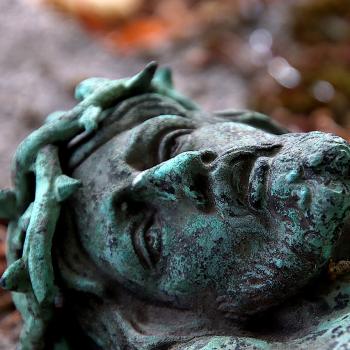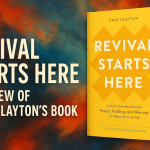
Many people often go through periods of darkness, sadness, and difficulty. Often in our day we call this depression. Our forefathers called it melancholy and Winston Churchill nicknamed it “the black dog.” We often do not know where to turn when we wrestle with bouts of depression. Many times we find ourselves embarrassed because we don’t know how many other people struggle through intense periods of depression too. In addition, depression becomes particularly difficult for the Christian because often in Scripture we are commanded to have joy and the way we feel during times of depression is anything but joyful.
Depression is real, painful, and defies easy answers, but the follower of Christ has tremendous resources at his disposal for fighting off “the black dog.” I want to highlight three in particular.
(Note: This post primarily deals with the spiritual aspects of depression. Depression can also have physical and physiological components which I am not qualified to address and will not get into in this post. If you find yourself wrestling with intense periods of darkness, or you are having thoughts about hurting yourself or others, I would encourage you to talk to your physician soon.)
Fight Depression with Prayer and God’s Word
I bring up prayer and the Bible first with some trepidation. The last thing you need to hear is to pray harder and you’ll be okay. Also, I do not want to insinuate depression is necessarily caused by a flaw in your spiritual life. We need to discuss prayer and the Bible first though because of what the Bible says. “Do not be anxious about anything, but in everything by prayer and supplication with thanksgiving let your requests be made known to God. And the peace of God, which surpasses all understanding, will guard your hearts and your minds in Christ Jesus.” Paul’s words from Philippians 4:6-7 remind the Christian he does not have to carry his depression alone. When stress, anxiety, and depression hit, turn to the Lord and unload it on him. He invites us to do so. Peter says in 1 Peter 5:7 we can do this because “he cares for you.” God loves you and wants to carry your burdens so you can have peace. Who else in your life is offering to carry your burdens? Turn to him and don’t try to carry your pain alone.
God’s word also gives us encouragement during times of anxiety and depression. In the next section we will reflect on the Gospel, and we need to bathe in the passages of Scripture which remind us of our standing before God and relationship with him. We also need to read the invitations to pray we covered in the last paragraph. These verses help us remember to pray when times are hard. Sometimes we want to run from prayer when we are depressed either because we are ashamed or don’t think God will listen, but the invitations to pray show us we should not be ashamed of our anxieties and let us know God intently listens to us as we pour out our heart to him. The Psalms also help fuel our prayers. Many of the Psalmists composed these prayers and hymns during intense periods of darkness. Reading and praying through the Psalms give you a vocabulary for your prayers. If you struggle with prayer, let the Psalms teach you how to pray.
Fight Depression by Remembering Your Identity
Often depression can make life feel like a hall of mirrors. In this carnival staple, you can walk past one mirror and look taller than by another one and look much shorter. If you lived in a hall of mirrors, you would have a distorted view of how you actually looked. Depression can cause the same kind of distortion with our sense of identity. A Christian going through a period of depression may believe God abandoned her or convince herself God is punishing her for something she has done. Prolonged spells of depression tend to leave a Christian devoid of real hope and doubtful about the future. The only answer to this hall of mirrors is to remind ourselves of what the Bible says is true about us because of Jesus. When the reality of who we are in Christ is distorted because of pain and darkness, the only answer is to go to the eternal truths of God which anchor our souls in times of turmoil and trouble.
Two particular truths provide balm to the soul of the Christian when times are hard. The person who trusts in Christ is no longer condemned before God. “There is therefore now no condemnation for those who are in Christ Jesus.” When a man, woman, boy, or girl has faith in Jesus, they no longer stand before God defined by their sins. Instead, the Christian experiences God’s free forgiveness because of the death of Christ for us. God also credits the perfect life of Christ to our life so we stand before God fully justified. Our sins are wiped away and he sees the perfect life of his Son when he looks at us. Christian, you may walk through times when you feel worthless and guilty, but remember God loves you and gave his Son up for you. You are not worthless because Jesus gave his life for you, and you are not guilty because Jesus took your guilt upon himself.
We should also remind ourselves of our adoption as the children of God. I can personally testify how remembering this truth during times of darkness provides comfort and encouragement. God adopts every person who trusts in Christ as his own Son and promises we will be co-heirs with his perfect son Jesus. Where before we were spiritual orphans with no hope or future, in Christ he brings us in as his own and gives us the promise of an incredibly glorious future. This truth helps during times of depression because it reminds us we have not been abandoned. God is the perfect father, and he never leaves us or takes us through anything that doesn’t work for our ultimate good.
Fight Depression with God’s Creation and Exercise
At the outset of this post, I mentioned we would primarily deal with the spiritual aspects of depression. Going outside to exercise does not feel like a spiritual answer, but history provides us with great examples of Christians who fought depression with God’s creation. Charles Spurgeon, a Baptist pastor in London in the late 19th century, battled depression the rest of his life after a horrid incident at the Surrey Music Hall. An estimated crowd of 10,000 gathered to hear him preach when someone in the upper gallery yelled “fire!” and the ensuing panic led to the trampling of seven people. Surgeon’s critics blamed him for the disaster and the pain followed him the rest of his life. Spurgeon spoke to his ministry students about the pain of depression which can be brought on by previous pain or by spending too much time inside. His admonition, while spoken to those studying for the ministry, applies to any person dealing with depression. (You can find this quote on page 158 of Lectures to My Students.)
Let a man be naturally as blithe as a bird, he will hardly be able to bear up year after year against such a suicidal process; he will make his study a prison and his books the warders of a gaol, while nature lies outside his window calling him to health and beckoning him to joy.
He who forgets the humming of the bees among the heather, the cooing of the wood-pigeons in the forest, the song of birds in the woods, the rippling of rills among the rushes, and the sighing of the wind among the pines, needs not wonder if his heart forgets to sing and his soul grows heavy.
A day’s breathing of fresh air upon the hills, or a few hours bramble in the beech woods’ umbrageous calm, would sweep the cobwebs out of the brain of scores of our toiling ministers who are now but half alive.
A mouthful of sea air, or a stiff walk in the wind’s face, would not give grace to the soul, but it would yield oxygen to the body, which is next best.
Heaviest the heart is in a heavy air, Ev’ry wind that rises blows away despair.
The ferns and the rabbits, the streams and the trouts, the fir trees and the squirrels, the primroses and the violets, the farm-yard, the new-mown hay, and the fragrant hops—these are the best medicine for hypochondriacs, the surest tonics for the declining, the best refreshments for the weary.
For lack of opportunity, or inclination, these great remedies are neglected, and the student becomes a self-immolated victim.
This never made real sense to me until a few years ago. I went through a particularly difficult time during January and February. Depression, frustration, and anger marked those two months. Then something changed the first weekend of March. The sun came out and the weather was a little warm, so I went in my backyard to do some work and read on the back porch. During those hours I began to feel alive again and tried to put together why I felt so much better. Then I remembered how dark and cold it was the previous two months. Most of my time was spent indoors and I was not going to the gym. This reality hit me again during a recent bout with some melancholy which was accompanied by some circumstances which kept me inside and away from the gym. Finally, I was able to get back outside to walk and workout. After walking two miles outside I went to the gym. On the sixth rep of my third set on bench press, I realized I felt the best I had in weeks. None of the external circumstances which had me down had changed, but the combination of time outside and exercise helped my mind and body deal with the difficulties. If you find yourself struggling and spend a significant amount of time inside, go outside. Sit on the back porch, go for a walk, or head into the woods and hike. God’s creation and some physical exertion will be good for your soul.
Bible study, prayer, remembering the Gospel, going outside, or exercising probably will not immediately “fix” the period of depression you are going through. You may even need to get outside help from your physician, but these resources God has given us help give us a different perspective on the darkness we walk through.
Related Posts:
“Why You Should Read the Psalms”
For Further Reading:
Depression by Ed Welch
When the Darkness Will Not Lift by John Piper
















